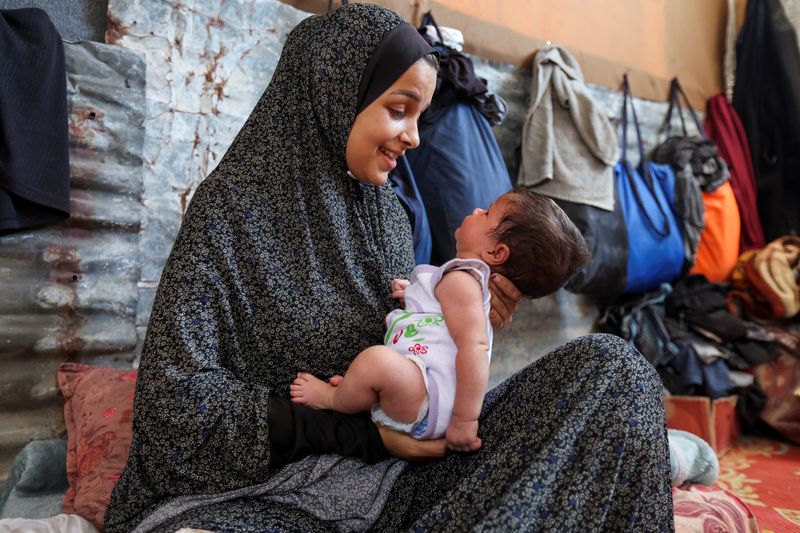By Ramadan Abed
DEIR AL-BALAH, Gaza (Reuters) - Gazan mother Rana Salah cradles her one-month-old daughter Milana in her arms in a sweltering tent for the displaced, and speaks of the guilt she feels for bringing her child into a world of war and suffering.
"If it were up to me, I wouldn't have gotten pregnant or given birth during the war because life is completely different; we've never lived this life before," she said, speaking at a camp in Deir al-Balah in the central Gaza Strip.
"I gave birth twice before, and life was better and easier for me and the child. Now, I feel like I've wronged both myself and the child because we deserve to live better than this."
Milana was born in a hospital tent by caesarean owing to complications with Salah's pregnancy. The family have not been able to return home due to the conflict, moving instead from one tent to another.
Milana is one of around 20,000 babies to have been born in Gaza in the last year, according to UNICEF statistics.
The current war, a particularly deadly episode in the decades-old Israeli-Palestinian conflict, was triggered on Oct. 7, 2023, when Hamas militants attacked Israel, killing 1,200 people and taking about 250 hostages, according to Israeli tallies.
Israeli air and artillery strikes in response have reduced much of the Palestinian enclave to rubble and more than 41,500 Palestinians have been killed in the Israeli assault, according to the Gaza health ministry. Most of Gaza's 2.3 million residents have been displaced.
INFECTION RISK
Salah fans Milana with cardboard and says the heat is bad for the baby's skin.
"Instead of returning to our house, we keep moving from one tent to another... where diseases are widespread and the water is contaminated."
The World Health Organization (WHO) has said postnatal services have decreased significantly in Gaza, so women who have complications have less access to the care they need, as do their babies.
Rick Brennan, the WHO's Eastern Mediterranean Regional emergency director, said malnutrition was a threat to newborns, particularly if their mothers were unable to breastfeed, as there was no access to breast milk substitutes.
Displacement and being constantly on the move are disruptive for a newborn and expose them to risks of infection, he said.
Manar Abu Jarad is staying in a school shelter run by the U.N. Palestinian refugee agency (UNRWA). Her youngest daughter Sahar was born on Sept. 4th, also by caesarean section. Her husband was killed in the war.
On hearing she would need a caesarean for the birth, she worried about how she would care for her other children.
"I already have three girls. I started shouting... How can I carry (water) buckets? How can I bathe my daughters? How can I help them and my husband is not with me, he was martyred."
Children rock baby Sahar, who is swaddled in a crib, next to Jarad.
"I've reached the point where I cannot carry the responsibility for this girl ... Thank God I found some help here," she said. She has borrowed what she can from family and uses one diaper a day for the baby as she can't afford more.
"I don't have the money to provide diapers or milk for her."

Jarad longs for an end to the war and a return to her home, even if it is just a tent next to her former home.
"The important thing is to go home. Enough of all the exhaustion we are experiencing here, enough carrying buckets, enough of the dirt in the bathrooms. It’s really, really hard and really tiring for us. Diseases are everywhere."